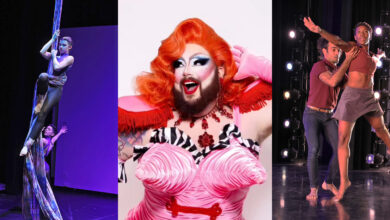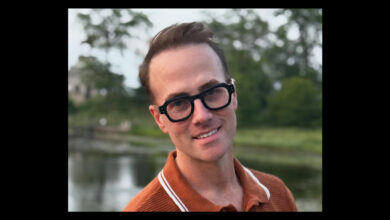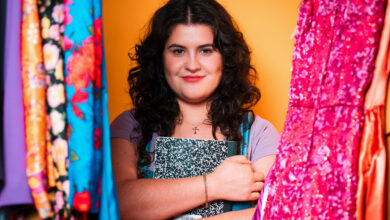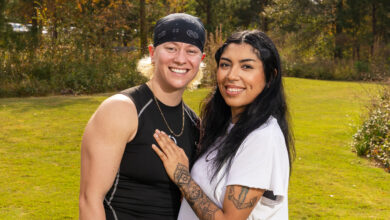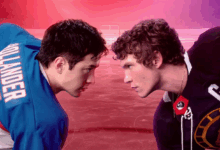
Defining Machismo: Queer Chicano Josh Inocéncio Explores Family Roots in One-Man Play
By Josh Watkins
It started with the Michoacán. The machismo. Josh Inocéncio—a queer Chicano—comes from a family whose lineage traces back to the P’urhépecha people of southern Mexico. People who, Josh’s cousin Chuy, says, “are on another level of machismo.” Through hyper-heterosexuality, Inocéncio was born to tell the story of the men in his family.
Inocéncio brings his one-man play, Purple Eyes, to Houston to explore his navigation through his family’s supremely masculine tendencies. He is celebrating being queer and Chicano in spaces that view queerness as a weakness. Inocéncio will perform as himself, his father, his grandfather, and his great grandfather, as he imagines and interprets his memories through a queer filter. With Purple Eyes, he hopes to understand how the United States and Mexico have culturally impacted his family.
Purple Eyes is the first installment in a trilogy of plays. Inocéncio has recently completed writing the second in the trilogy, which will highlight his Austrian ancestry. The third and final play will present his Appalachian identity.
Inocéncio plans to bring Purple Eyes to university student organizations and cultural centers that support Latino and LGBTQ communities.
Josh Watkins: What is Purple Eyes?
Josh Inocéncio: Purple Eyes is my solo auto/biographic piece. I say auto/biographic with a slash. Essentially what the play is, I am investigating, as a performer, my Mexican cultural inheritances and disinheritances from our origins in Michoacán Mexico and Houston. It looks at four generations of Inocéncio men—my great grandpa, my grandpa, my dad, and then me. I call it an “auto/biography,” because I’m not only seeking to understand myself and share my own story, growing up Latino and gay, but I’m using this history of the past 100 years really, to understand myself in that lineage. How the ancestors breathe behind me and inform my experience in the 21st century.
So I go through this play looking for moments in which all of these men, including myself, contest our hyper-masculine environments, these environments where they contest this often violent and toxic masculinity and where you can see their own queerness—even though they’re heterosexual—coming forth.
It’s particularly poignant with my dad. The play ends up becoming a father-son play. He used to do detective work for Harris County Sheriff’s office—he did undercover work for narcotics and vice. One job he did—that no one else would do— was that he would dress up in drag and go undercover in the gay clubs to look for drugs. So growing up, that was always the most fascinating to me. He didn’t just go to gay clubs, he would wear full drag depending on where he was going and he would wear makeup and dresses and heels. So I have a moment in the play where I imagine what that might have looked like—going to the Numbers Club in Montrose. So yeah, this is where much of the history happened. That’s one reason I wanted to bring it to Houston, because so much of the play is grounded in Houston.
How did your dad being an undercover cop in gay clubs affect you coming to terms with your own sexuality?
Hearing those stories early on and his position towards them, his comfort in his own sexuality and his own masculinity, to be able to do that as this straight male cop, I found it really inspiring. So for him to perform this alternative masculinity really helped me embrace my own.

This play will certainly connect with people of all walks of life. Who do you hope to reach out to?
I think although this play is very specifically my experience as this white, Mexican, Austrian guy from Houston—it is very relatable to the Chicanos here in Texas and also Latinos on a broader spectrum. So while these stories are very personal to me, they’re characters to everyone else. The most specific group that I want to reach are other LGBT Latinos who are maybe going through the same thing, or have gone through it before. Some people who have seen the play, who have LGBT children, have said that they “understand them so much better.” So I want to reach people who are skeptical about the [content] as well. So I’d say Purple Eyes is for everyone and I’d love for anyone to see it. I’m just trying to share a perspective of what it’s like in this specific body growing up in Texas and how I view the world based on my subjectivity as a queer Latino. I want to reach people like me, but also the ones who aren’t like me.
You focus on the terms “Chicano” and “machismo” a lot. Can you tell me what they mean to you, beyond the standard translations and definitions?
It is a very political term. It’s not just a demographic description. You’re hailing a history when you use [the term]. I think it’s a term of resistance, it’s a term that has lineage—which is really important to me. You know, I don’t really see myself as Mexican American because I wasn’t born in Mexico. I have some problems with the term “Hispanic,” because it is kind of a colonial term, where Chicano is more indigenous—it’s kind of a term on our own terms.
Machismo describes this very specific Latino masculinity. It is a colonial masculinity, something that stems from Spain. So for me, this idea of breaking or rupturing machismo somehow is a decolonizing project that is very specific to Latino communities. For the play, specifically, it’s very much about the machismo in this Chicano community and how that masculinity operates as a colonizing factor.
Without giving too much away, what’s your favorite moment in Purple Eyes?
It’s changed every time that I’ve performed it. Right now, the moment that is most electrifying for me to perform is when my dad goes into a XXX video store. It’s his first time working any kind of queer space and he doesn’t know what to do. He’s there in the back room with a gloryhole trying to figure out what to do. Some guy shows up at the gloryhole next to him—and that’s all I’ll really say! But, yeah, that’s been the most fun to perform. That’s one of the most consistently funny moments. The story is actually based on an interview that I did with him, so it’s a monologue fashioned out of things that he told me.
Inocéncio will be performing the piece as a press event here in Houston, on August 20. For tickets and information, go to www.joshinocencio.com or email Josh directly at josh.inocencio14@gmail.com.


